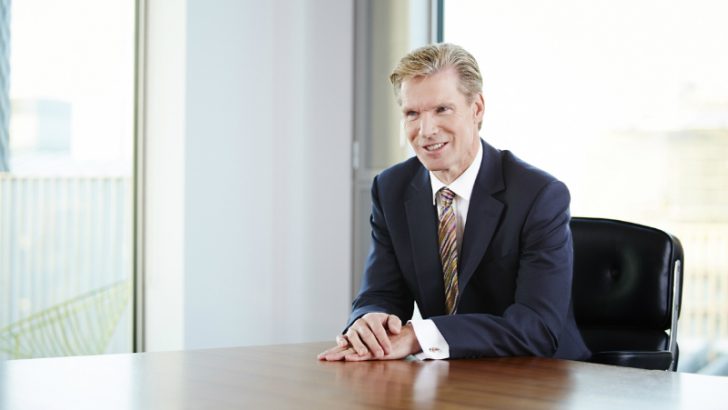
A successful Sage Summit was drawing to a close. We were lucky to grab some time with the CEO of Sage, Stephen Kelly.
ET: Could you tell us succinctly how you would describe Sage?
Stephen: Champion of Small to Medium Businesses, the voice of the entrepreneur.
ET: How would you describe your leadership style?
Stephen: Very open, transparent, very connected to our customers. We provide customers awesome technology and just incredibly relentless around the communication of that.
ET: What’s your view on technology in business?
Stephen: It’s just so fundamental because it’s changed everybody’s lives. As consumers, in the last ten years, it’s mind blowing. We want to apply the paradigm we have as consumers, running our lives from the palm of our hands, to the entrepreneurs we serve and give them awesome technology.
ET: How has software supported your business?
Stephen: Immensely. When I joined Sage we had pretty poor systems, very fragmented, poor data. We’re doing a complete root and branch transformation led by my CFO, Steve Hare. The great news is we’re all using all our own products.
ET: What are the key challenges currently faced by your industry?
Stephen: The reality for the industry is the innovation agenda. There are a lot of big companies out there in denial around innovation and trying to protect the past. What our business users and entrepreneurs need are innovators. Those people who are going to invent everything from a totally different way of running a business to seismic game-changing productivity improvements.
ET: What are your personal challenges for the next 12 months?
Stephen: Trying to find 36 hours in a day.
ET: and your key business challenges?
Stephen: It’s all about execution. We’re very clear on our vision, our ambition and our strategies. We will, articulate and share them here in the conference. With our customers, our investors and our colleagues it’s just all about show time. It’s all about execution. You know, pithy quotes like, “A Class strategy, B Class execution is always inferior to B Class strategy, A Class execution.” It’s all about execution.
ET: What was your darkest business day and how did you overcome it?
Stephen: In the context as a CEO. Despite what people think, you just feel this huge weight on your shoulders. It’s a massive responsibility for the livelihoods of colleagues and the success of customers. It was in my NASDAQ CEO career, in the dark days when there were all the corporate scandals at places like Enron. I effectively shifted the whole tone and the environment around business at a time when candidly CEOs were pretty much vilified in the press. That was a pretty tough time. We had to go forward with things like Sarbanes-Oxley compliance and it was a massive drain on the company. We diverted millions of dollars and resources to make sure we had governance similar to GE and IBM even though we were a fraction of their size. It meant that we diverted resources away from customers and innovation and I just felt bad about that.
ET: What was your proudest moment?
Stephen: Since I’ve been at Sage, definitely when I went down to Soweto and I saw the work the guys had done building a school. Where these really vulnerable kids who’ve got no hope in the current environment in Soweto, are able to not only get an education but also get access to laptops in a safe environment where they can learn. These kids, from the age of about four to nine, were absolutely tiny, even the nine year olds, just because they’re malnourished. It just genuinely brought tears to my eyes.
I just thought, “Wow. These, we just got to do a better job for these kids.” That really moved me and, through the Sage Foundation, there have been loads of situations where we’ve done things that directly impact communities for the better. We use words like “share the love” but it’s ultimately share the success and prosperity we’re creating with people who are really disadvantaged.
ET: Can you share a tip for new CEO’s?
Stephen: I’d say trust your instincts. Be bold and always do what’s right.
ET: Should every CEO be an entrepreneur?
Stephen: Not necessarily. It very much depends on the industry, in utility industries it may not be appropriate. In terms of innovation industries, I think entrepreneurship and entrepreneurial skills are really important. I think the biggest entrepreneurial skill is just ‘love your customers’. Just live in the shoes of your customers. Then, invent a better future for them.
ET: You;ve done a lot of transforming at Sage and it’s ongoing. Do you have a tip you can share about transformational projects or leading transformational programs
Stephen: One word – belief. You’ll get told by lots of nay-sayers that it’s not possible, you’re going too fast. You’ll get told “We did this in 1947 and it failed then and we retried it in 1963 and it was a disaster and it almost killed the company.”
You’ve just got to believe. Trust your instincts and have the conviction to do the right thing. Obviously, always pursue your moral compass but people deserve something better. When you’re driving a big change agenda, what you typically find is there is a sort of frozen middle of resistance and there’s some initial rejection. But when you see the guys at the sharp end in customer services or those actually dealing with customers, they think it’s a breath of fresh air. They know that what you’re talking is no more than common sense. They just want you to actually enact it in the process of systems and incentives and the culture of the company, in the very DNA of the company to make it a better place to work for everybody.
ET: You’ve been an angel investor in the past, do you have any tips for fund raising for start-ups?
Stephen: The biggest thing, is just don’t get deluded that it’s all about the idea. Actually, it’s all about you. The investor’s buying the management team, the confidence you have and the diligence that you have done. That will give the investor reassurance that they should back you.
I know there’s some data around this. I think it’s seventy percent of investment decisions are based on management teams’ confidence, belief, conviction, and credibility, particularly if you’ve got a management team that’s done it before. That speaks very loudly to good investment decisions.
ET: What was the latest business book you read, your favorite book on podcast?
Stephen: The most recent one was “Work Rules!” (by Lazlo Block). It is sort of the Google story, particularly around recruitment and talent capability. That’s probably the biggest constraint any company has in terms of the capability, refreshing the capability and, obviously, nurturing the capability.
ET: How do you prioritize your day?
Stephen: There’s a risk as a CEO that you really are on the treadmill where what you’re going to do in the day and the week is fed to you, like a menu. You just kind of follow it relentlessly and religiously. You have got to break out of that because you’ve got to get some reflection time. You’ve got to say this week, this day, this hour, this meeting: “Did I really make a difference? Did I actually really connect the time with the strategic priorities for the company and execute my time and priorities accordingly?”
I’d say, candidly, about 50- 60% of my time is process, governance or related meetings. The rest of my time is around driving a strategy and execution. I spend a huge amount of my time going out to meet customers, partners and accountants.
Two weeks ago, I was in Madrid and Barcelona and I’d had back-to-back meetings from breakfast, at seven o’clock, through to management team dinners until eleven thirty. I still met 100 customers and 50 partners. I think it’s so important for chief executives to always focus on the people who pay the bills, the customers, and actually go and find out what’s on their mind. Nothing’s ever perfect and they’ve always got some issues they want to share with you. You could actually change your company to improve their lives.
This focus on the customer is something that Kelly believes can be turned into a huge positive, he continued:.
Stephen: I go out to meet customers even at the weekend. I’ll go down the High Street and talk to Sage customers. I guarantee normally they’re very happy but there’s always one or two little things that they tell us. “You could do much better on this” or “this part of the product doesn’t work well” and I just make a little note of that. Monday morning, in a kind of very non-blame way, we want to fix it for the customer.
One thing I did when I joined was to set up a Code Red process. Any customer in the world, any partner, any accountant can actually ping me on Twitter and social media platforms, email, or call me and literally, within minutes, there’s a team mobilized of “Red Adairs” to fix their problem and put out their fire for them. I probably still get five or six a week. Ever since I joined, there’s only been one situation from one customer that we couldn’t resolve to their total satisfaction If you actually douse a fire for a customer, particularly when they run a business and they’re working flat out, you’ve created a regular fan for life.
Companies talk about stuff and glossy PowerPoint slides but the real heart of the company is companies who double down, never duck an issue, never blame anything and just fix it for the customer. That’s the real great strength of the culture.
ET: What new technology would impact your business most and how should the industry react?
Stephen: We are seeing trends like machine learning. We’ve launched an amazing chat bot, called Pegg. It’s goodbye, Admin, and hello, Pegg. It’s totally revolutionary. I grew up in technology and remember two-year projects where we designed user interfaces and user experiences. This disintermediates everything that we learnt in technology in terms of design of apps, which is amazing. Back in the client server or even the mainframe days the amount of time spent on user experience was immense. Bots like Pegg are going to change to change that world.
The other area I think is really powerful is data sciences. We can help our entrepreneurs and businesses by becoming both their personal trainer and by giving them the data to be their champion challenger. To say; if you look at plumbers in south London, an individual plumber’s payment days is X relative to the other plumbers in south London. Almost like an internal kind of TripAdvisor, a ready reckoner of how their performance is and then be suggestive of how they can improve it.
Take Brexit, we’ve done a load of advice and guidance for small businesses in the new environment. How do they actually de-risk. If they’re an exporter how do they take advantage of the cheaper pound? We are becoming much more a champion of small business with coherent, strong business advice to allow them to grow and be more successful.
It’s connecting technologies where the magic comes in. Whether it’s data sciences, predictive analytics or things like machine learning, I think there’s tremendous opportunity. There are things like, mobility, which is pretty much table stakes. We definitely think entrepreneurs will run their business from the palm of their hand but it could also be exploiting the internet of things. There’s loads of stuff we’re doing with some of our manufacturing clients around internet of things.
ET: How do you keep believing in your vision when the odds are stacked against you?
Stephen: Belief in your conviction and pursuing your moral compass. It is always the right thing to do.
ET: What’s the one question you’d like to ask another CEO to answer?
Stephen: What’s the most important thing that keeps you up at night? If the answer is not customers, then they’re missing the point.
ET: Well I was going to ask you to answer it yourself, but can you elaborate further.
Stephen: When we started in technology, sometimes people in the B2B world didn’t really see their customers but now in the social world everybody sees, every minute of the day. I think the world of authenticity, honesty, and transparency is the world of today and forever. That means you have to be really on your toes. You have to be very self-critical. You always have to be evolving and improving the customer value so these guys know that they can sleep well at night. They also know that they’re dealing with a company with real integrity who are not just talk but who really walking the talk. I think that all starts and finishes with the CEO.
ET: Thank you.


























